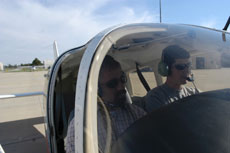Students soar to new horizons
September 24, 2004
While the idea of riding in a plane can be extremely intimidating to some students, to those who are in the Institute of Aviation, flying a plane is just another day of class.
As incoming freshmen, students who wish to enter the institute must pass a somewhat intensive physical test as well as have 20/20 or correctible 20/20 vision, said Kate Mallman, a flight instructor for the institute. They must also submit an essay explaining why they are interested in aviation.
Students must decide between two different paths: the Professional Pilot Program or the BS in Aviation Human Factors. The Professional Pilot Program is a two-year program that allows students to pursue their private pilot license in addition to other majors. The BS in Aviation Human Factors has basically the same technical flight classes as the Professional Pilot Program but is geared more toward advanced level aviation courses and requires more psychology courses. Most flight accidents are caused by pilot error, and the BS deals more with trying to make the trainees mentally strong enough to avoid those errors, said Katie Yeats, junior in aviation.
Within the first week of class freshman year, when most students have not even had their first test, aviation students are up in a single engine plane learning the basics of flying, said Jason Rassi, senior in aviation and aviation instructor.
Part of the program is having select seniors, like Rassi, instruct beginning students. For Mallman, this is an effective practice because the seniors are only a few years removed from where the beginning students are. They went through the same training.
Get The Daily Illini in your inbox!
“The information is fresh in your mind,” Mallman said. “You really understand what the students are doing.”
By the end of their first semester in the program, students “solo” a plane for half an hour. By the end of second semester they are “soloing” longer trips to places like Peoria. There are restrictions to what beginning students can do, however.
“Well, they aren’t going to be landing on the first day,” Rassi said, laughing. “‘These are the controls, this is the throttle.’ Basic flying skills are what they’re working on.”
The Institute of Aviation is based in Savoy where most of the flight instruction takes place. The students fly three times a week in two-hour periods and progress to larger, faster planes as they gain experience. The Piper Archer is the first plane students learn to fly. It reaches speeds of about 100 to 110 mph. The next plane they progress to is the Piper Arrow, which reaches speeds of about 130 mph, Rassi said. Finally, they work their way up to the Piper Seminole, which can go as fast as 140 mph.
Most students in the program are there because of a passion for flying, Yeats said.
For Rassi, who also flies Chinook helicopters for the Army National Guard out of Peoria, the feel of complete control is a major reason he loves to fly.
“You’re in control of the airplane,” Rassi said. “When I finally got to where I was flying the Seminole, I felt like I had really accomplished something.”
For Yeats, the thrill of flying a plane is not an easily describable experience.
“It’s so different,” Yeats said. “People don’t understand until they go up and experience it. It’s its own entity. It’s a total sense of freedom when you’re flying.”
Since the Sept. 11, 2001, attacks on the World Trade Center, many people have thought twice about flying. Interest in flying corporate or privately owned jets rather than commercial jets has increased as a result of the World Trade Center attacks, said Tom Emanuel, associate director for academic affairs in the institute. However, Mallman maintains that events such as Sept.11 did not change her passion for flying.
“It really didn’t scare me too much,” Mallman said. “But it was eye opening. It was just shocking that it actually occurred, but it didn’t change me. I still want to be a pilot.”
Yeats agreed that it is not a big issue for her and many other pilots.
“It didn’t really change me that much,” Yeats said. “A lot of people in aviation really love flying and you don’t really think about that. You just think of how fun it is.”







